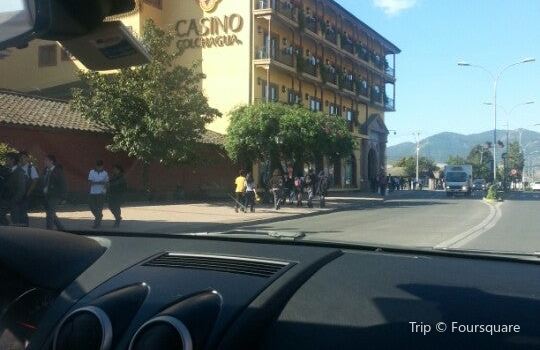City and Commune | |
Location in Chile | |
| Coordinates (city): 34°38′14″S71°21′47″W / 34.63722°S 71.36306°WCoordinates: 34°38′14″S71°21′47″W / 34.63722°S 71.36306°W | |
| Country | Chile |
|---|---|
| Region | O'Higgins |
| Province | Colchagua |
| Government | |
| • Type | Municipality |
| • Alcalde | William Arévalo |
| Area | |
| • Total | 419.5 km2 (162.0 sq mi) |
| Elevation | 173 m (568 ft) |
| Population (2012 Census)[2] | |
| • Total | 34,914 |
| • Density | 83/km2 (220/sq mi) |
| • Urban | 18,603 |
| • Rural | 13,784 |
| Demonym(s) | Santacruzano |
| Sex | |
| • Men | 16,160 |
| • Women | 16,227 |
| Time zone | UTC-4 (CLT[3]) |
| • Summer (DST) | UTC-3 (CLST[4]) |
| Area code(s) | 56 + 72 |
| Website | Official website(in Spanish) |
Te esperamos para disfrutar de un show muy especial junto @americooficial no te lo puedes perder @casinocolchagua @hotelsantacruzcolchagua compra tus entradas @ticketprochile #musica🎼🎶 #amorir #americoenvivo #AmericoIntimo #colchagua #casino #hotel #ValleColchagua ♥️♠️♦️♣️ 📌Salon Colchagua 🕙 22:00hrs. Casino Colchagua, Santa Cruz: See 255 reviews, articles, and 19 photos of Casino Colchagua, ranked No.14 on TripAdvisor among 19 attractions in Santa Cruz.
Santa Cruz is a Chileancity and commune, located in the Colchagua valley, in the O'Higgins Region, located on the southern shore of the Tinguiririca river, 110 miles from Santiago, Chile's capital city and 27 miles from San Fernando.[5]
History[edit]
There is no exact data about the founding of the city, although there is an official date when the city became a municipality in the year 1891,[6] the same year that Pichilemu did.
From its beginnings, the town was a center of handcrafted artifacts and agricultural development, with wheat, tomatoes, and wine being the main products of the area. Because of the relation with countryside traditions from its beginning, Santa Cruz offers an authentic look at the rural traditions of Chilean culture expressed in the wine, the food, and the traditional sports such as the rodeo.
The city of Santa Cruz was among those affected by the 2010 Chile earthquake.[7]
Demographics[edit]
According to the 2002 census of the National Statistics Institute, Santa Cruz spans an area of 419.5 km2 (162 sq mi) and has 32,387 inhabitants (16,160 men and 16,227 women). Of these, 18,603 (57.4%) lived in urban areas and 13,784 (42.6%) in rural areas. The population grew by 10.7% (3,129 persons) between the 1992 and 2002 censuses.[2]
Tourist attractions[edit]
Santa Cruz has very well preserved colonial architecture. The most famous tourist attractions of the city are located in the Plaza de Armas. These include the historic Santa Cruz church, Santa Cruz Hotel, and Carillon Clock, the latter of which was constructed by order of mayor Carlos Cardoen Decoene in 1970, and which is used today as an interactive tourist information center. Other noteworthy attractions include the Museum of Colchagua, the Casino of Colchagua, and the Wine Train vineyard tour.
Economy[edit]
In the last two decades, rural tourism has become an important source of revenue for the city, the development of this industry was due specially because of the vineyards placed in the valley joint in a project called 'Wine Route',[8] that offers several tours in the area[5]
Climate[edit]
Temperate warm climate, with rains between June and November.[5]
Administration[edit]
As a commune, Santa Cruz is a third-level administrative division of Chile administered by a municipal council, headed by an alcalde who is directly elected every four years. The 2012-2016 alcalde is William Arévalo.[1]
Within the electoral divisions of Chile, Santa Cruz is represented in the Chamber of Deputies by Mr. Ramón Barros (UDI) and Mr. Juan Carlos Latorre (PDC) as part of the 35th electoral district, (together with Placilla, Nancagua, Chépica, Lolol, Pumanque, Palmilla, Peralillo, Navidad, Litueche, La Estrella, Pichilemu, Marchihue and Paredones). The commune is represented in the Senate by Andrés Chadwick Piñera (UDI) and Juan Pablo Letelier Morel (PS) as part of the 9th senatorial constituency (O'Higgins Region).
See also[edit]
- Media related to Santa Cruz, Chile at Wikimedia Commons

References[edit]
- ^ ab'Municipality of Santa Cruz' (in Spanish). Retrieved 13 December 2010.
- ^ abcd'National Statistics Institute' (in Spanish). Retrieved 13 December 2010.
- ^'Chile Time'. WorldTimeZones.org. Archived from the original on 2007-09-11. Retrieved 2010-07-28.
- ^'Chile Summer Time'. WorldTimeZones.org. Archived from the original on 2007-09-11. Retrieved 2010-07-28.
- ^ abc'Santa Cruz'. LetsGoChile.com. Retrieved 5 September 2010.
- ^[1] Historia de Santa Cruz
- ^http://www.watoday.com.au/world/aid-delays-add-to-chiles-desperate-plight-20100304-pkjb.html?autostart=1
- ^[2] Ruta del vino/

Casino Colchagua Santa Cruz Chile 2017
External links[edit]
| Wikimedia Commons has media related to Santa Cruz, Chile. |
- (in Spanish)Municipality of Santa Cruz
- (in Spanish)Santa Cruz Chile